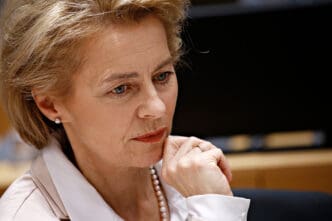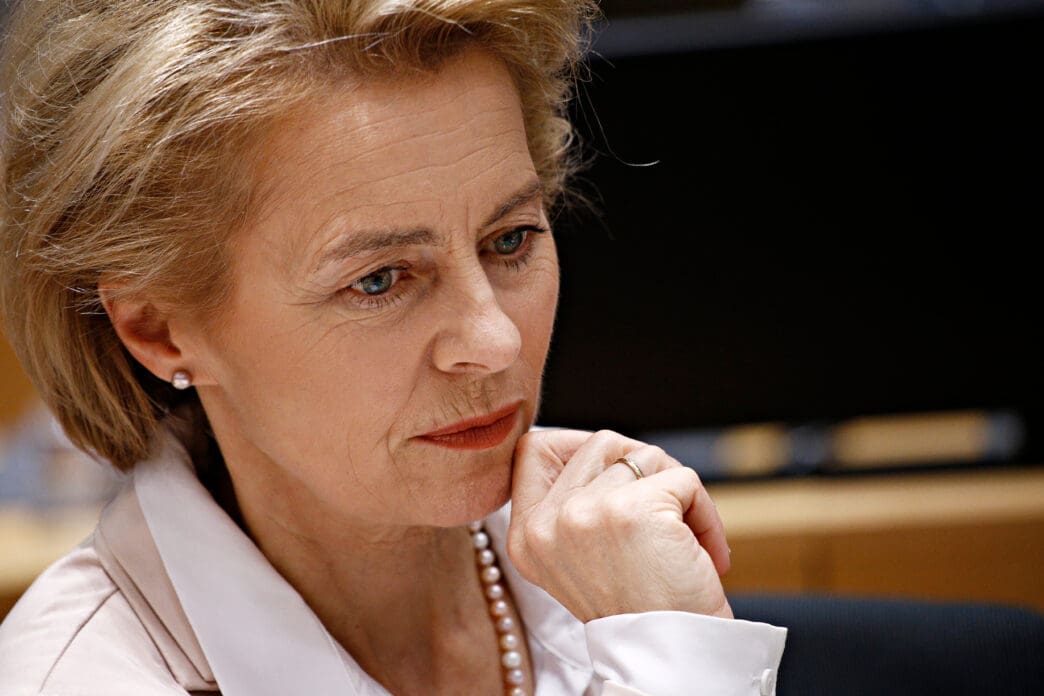Executive Summary
The Story So Far
Why This Matters
Who Thinks What?
A broad coalition of the European Parliament’s main political groups has united against European Commission President Ursula von der Leyen’s proposed €2 trillion budget plan for 2028-2034, threatening to block negotiations unless significant changes are made. The unprecedented opposition from the European People’s Party (EPP), Socialists & Democrats (S&D), Renew Europe, and the Greens signals deep dissatisfaction with the Commission’s approach to the Multiannual Financial Framework (MFF).
EU Budget Clash
The four centrist groups, which rarely agree on major policy issues, signed a joint letter outlining seven key demands, particularly challenging the proposal to merge regional and farm subsidies into national and regional partnership plans totaling €865 billion. This move has sparked alarm among regional leaders and farmers, who fear a loss of direct funding and oversight.
Siegfried Mureșan, the Parliament’s lead negotiator, stated that the widespread opposition would make it difficult for the Commission to defend its current proposal. The rebellion from the very coalition that supported von der Leyen’s second mandate highlights growing fatigue with what some perceive as the Commission’s top-down decision-making style.
The groups are advocating for the Common Agricultural Policy (CAP) and Cohesion Funds to remain separate, alongside a stronger role for Parliament in approving and revising member states’ spending plans. A Commission spokesperson indicated readiness to engage in “constructive exchanges” with Parliament and Council but declined to comment on specific demands.
Even the right-wing European Conservatives and Reformists (ECR) group joined the chorus of criticism, though for different reasons. While the centrist alliance argues the plan centralises too much power in national capitals, the ECR believes it leaves too much in Brussels’ hands, also opposing the merger of cohesion and agricultural funds.
An EU diplomat warned that Parliament’s unified defiance could destabilise the delicate balance of MFF talks, stating, “The EP is playing with fire.” Parliament has set a deadline of November 12 for a plenary debate in Brussels.
Institutional Scrutiny
Ombudsman Promotion Under Fire
European Ombudsman Teresa Anjinho is facing criticism after promoting her head of cabinet, Lampros Papadias, to the office’s most senior civil service role, Secretary General. Anjinho, a former centre-right Portuguese politician, informed staff of the decision via an internal email eight months into her mandate.
A former staffer expressed concern, calling the move a “very sad day for rule of law in the EU administration” and suggesting it does not present a favorable image for the new ombudsman.
Climate Target Negotiations
Denmark, holding the rotating presidency of the EU Council, is working to broker a compromise on the EU’s 2040 emissions target ahead of an environment ministers’ meeting. The goal is to overcome a blocking minority led by France, Poland, and Italy, who are reportedly unhappy with the proposed 90% emissions reduction target.
To facilitate an agreement, Denmark has proposed a biennial review of the target, allowing for downward adjustments if implementation proves too burdensome, alongside promises of additional support for industry and farmers. Ministers will also decide on the extent of permitted emissions outsourcing and the mechanism’s implementation timeline.
Anti-Corruption Directive Stalled
A planned trilogue on the bloc’s anti-corruption directive has been delayed, meaning the file will not be addressed in November as hoped. Deep divisions persist over whether to criminalise “abuse of functions,” pushing the troubled directive further into uncertainty, with some officials fearing it could collapse entirely if no breakthrough is achieved by year-end.
Migration Pact Assessment Delayed
The European Commission’s first assessment identifying EU countries under migration pressure and detailing obligations under the new Pact on Migration’s “solidarity pool” has been postponed. Originally due by October 15, the delay underscores the political sensitivity surrounding the report, which dictates whether countries must relocate asylum seekers, contribute financially, or provide other support. Sources now suggest the document could be released next week.
Geopolitical Developments
EU-China Rare Earths Talks
European and Chinese officials are conducting “technical” talks in Brussels concerning Beijing’s export controls on strategically crucial rare earths. China’s most stringent restrictions on these metals, which have significantly impacted Europe’s industrial base, appear to have been suspended following President Donald Trump’s recent meeting with Chinese President Xi Jinping.
European officials, including European Central Bank President Christine Lagarde, have adopted a cautious stance, awaiting clarity on the precise outcomes of the US-China discussions. The results of Friday’s EU-China meeting remain uncertain, with no official read-out yet confirmed by the Commission.
Eastern Mediterranean Diplomacy
Greek Prime Minister Kyriakos Mitsotakis has announced plans to convene a multilateral meeting of Eastern Mediterranean countries to address ongoing maritime disputes. The initiative aims to bring together Cyprus, Egypt, Turkey, and Libya to explore solutions to long-standing disagreements over maritime zones vital for gas and oil exploration. Given the region’s complexity, optimism for a swift resolution remains limited, though potential energy resources are of strategic interest to the EU.
National Political Landscapes
In France, the National Assembly narrowly backed a non-binding resolution from the far-right Rassemblement National to repeal the 1968 Franco-Algerian migration accords, marking the first RN initiative to pass. The vote, celebrated by Marine Le Pen as “historic,” drew criticism from left and centrist MPs who accused the centre-right of aligning with the far-right.
Italy’s Senate passed a constitutional reform to separate the careers of judges and prosecutors, a long-held objective of the late Silvio Berlusconi and a central part of Giorgia Meloni’s agenda. Lacking a supermajority, the measure will proceed to a referendum next spring, with Meloni hailing it as a “historic milestone” while opponents warned of a “power grab” threatening judicial independence.
Spanish Prime Minister Pedro Sánchez, facing a Senate inquiry into alleged corruption, denied wrongdoing, stating he received only “anecdotal expenses” from his Socialist Party, never exceeding €1,000. He defended his wife and brother, both under investigation, and accused the opposition Popular Party of engaging in “mudslinging.”
Portugal, Spain, and the European Commission have agreed on steps to complete the Lisbon-Madrid rail link by 2030, aiming to cut travel time between the capitals to approximately five hours. A high-speed connection is planned for 2034, with Brussels already committing €235 million to the project.
The Dutch Farmer-Citizen Movement faces projected steep losses in upcoming elections, potentially falling from seven to four seats after a brief period in a coalition government. Founded on promises to protect agriculture from EU regulations, the party’s domestic plans largely stalled before the coalition’s collapse.
Far-right Czech politician Tomio Okamura, backed by Andrej Babiš’ ANO party, is poised to become Speaker of the Chamber of Deputies after his bloc secured a narrow majority in recent elections. Critics warn his appointment could harm the country’s international image.
Latvia has voted to withdraw from Europe’s convention on violence against women, known as the Istanbul Convention. The move, supported by one of Prime Minister Evika Siliņa’s coalition partners and the opposition, defied both Siliņa and the president, reigniting debate over the convention’s gender definitions.
Polish Prime Minister Donald Tusk and his Lithuanian counterpart Inga Ruginienė have agreed that Poland will reopen its border crossings with Belarus around mid-November. The reopening was initially planned earlier but was delayed due to Lithuania’s concerns over rising tensions along its own border.
Lithuania briefly closed Vilnius airport due to nearby balloons, marking the sixth such airspace violation this month. Officials suspect smugglers and accuse Belarus of inaction, while Belarusian President Alexander Lukashenko dismissed Lithuania’s response as a “crazy scam” and accused the West of hybrid warfare.
Emma Wiesner, a Swedish liberal MEP with the Centre Party, announced her departure from the social media platform X, citing its “toxic tone” and a political climate that has made her “more cynical and bitter.” Her decision follows the resignation of Centre Party leader Anna-Karin Hatt two weeks prior due to harassment and threats.
A social media storm erupted in Slovakia over claims that the government had imposed a speed limit for pedestrians. In reality, a new traffic law amendment, effective in 2026, caps cyclists and e-scooter users on pavements at 6km/h to enhance pedestrian safety, with police clarifying it “doesn’t ban sprinting for the bus.”
Upcoming Agenda
Vice-President Maroš Šefčovič is scheduled to meet Italian Foreign Minister Antonio Tajani in Rome, while Executive Vice-President Valdis Dombrovskis will participate in the second dialogue on implementing the Recovery Plan.








